Upgrade your privacy with these special versions of Firefox
Forget the eyes: Web browsing is the true window into your soul. It shows what you like to read, watch, and buy–and what new jobs, or relationships, you might be considering. Marketers know this and pack websites with tracking cookies (small text files) that allow them to follow your web wanderings. Internet service providers (ISPs) may even intercept your web traffic to observe the sites you visit and files you download.
The nonprofit Mozilla Foundation provides some of the best online privacy technologies in its Firefox web browser. It’s releasing its latest version, 64, on December 11.
But before new tools make it into the so-called “Release” versions of desktop and mobile apps, they get trials with work-in-progress versions for computers, phones, and tablets. The in-development editions for PC and Mac–called Firefox Beta and Firefox Nightly–may still have bugs.
You can install both Beta and the fully baked Release version, as a backup. Your bookmarks, saved passwords, and other particulars will stay the same across both apps. But a bad Beta crash may affect corrupt data. To be extra safe, Mozilla recommends (and walks you through) setting up a separate user profile for each browser.
For mobile devices, Mozilla offers its privacy-centered Firefox Focus browser for Android phones and tablets, iPhones, and iPads.
Desktop privacy guards
Mozilla has a confusing assortment of PC and Mac programs. The Release version is considered to be “stable,” with all features working properly. (Of course, bugs sometimes make it into all software.) A new Release comes out every six weeks.
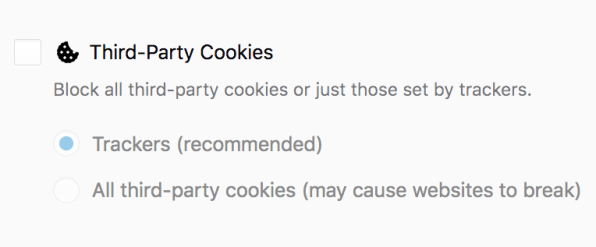
And then there’s Firefox Beta and Nightly. Beta contains close-to-final features or upgrades destined for the next Release version. “Nothing gets into the Beta unless we have the intention to ship it,” says Nick Nguyen, Mozilla’s VP of Firefox. A new version of Beta comes out the same time the new Release version does. So if all goes to plan, features that premiere in Beta will make it into the next Release, six weeks later.
Firefox Nightly is an experimental version whose code is updated every evening–hence the name. However, major revamps of Nightly also come out on the same six-week cycle. “Nightly is a very raw preview of potential features for Firefox,” says Nguyen. “Expectations for stability should be much lower.”
Here’s an example of how new features “ride the train,” as Mozilla says, from Nightly to Release:
In June, Nightly added the ability to encrypt the process of looking up a website address (converting, for instance, the “google.com” you type in to the numerical IP address 172.217.7.196 that internet routers use). Called DNS over HTTPS, the capability makes it a bit harder for a greedy ISP, malicious hacker, or snoopy government to see what sties you visit.
At the time, setting it up required going into the guts of the Nightly program, in a somewhat-hidden portion called the Configuration Editor, finding an obscurely named component, and changing a numerical value. This is not for the technologically faint of heart, although a Mozilla blog post did provide clear step-by-step instructions.
There’s high likelihood, but no guarantee, that a feature will make it beyond Nightly. In the case of DNS over HTTPS, it got into the Beta version in September as a simple checkbox option in the more user-friendly Preferences section of Firefox. And on October 23, this checkbox option made it to the Release version.
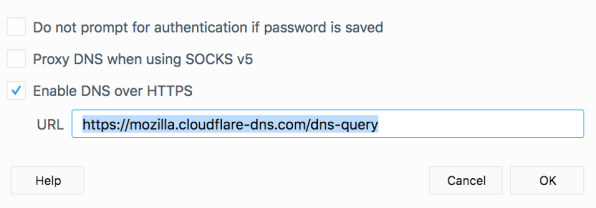
You can get a preview of all the new features (privacy-related and others) coming to Firefox on the Future Releases blog.
The latest privacy features in beta 65
As the Release version of Firefox hits 64 on December 11, the Beta hits 65, providing access to the latest well-honed (but maybe not perfect) features. The key privacy component will be improved protection from tracking by advertisers.
In August, users of the Nightly version got a new ability to block communication by so-called “third-party” cookies that report data back to someone other then the website you are visiting, such as advertising networks that track surfing behavior and build profiles. In September, the option came to the beta version, and in October it was enabled by default in Beta.
Enhanced tracking protection will not be on by default in the new Release 64 version, as Mozilla wants to test it more. Enabling it manually requires making sense of two confusing, and confusingly similar, setting options: One labeled “Trackers” and one “Third-Party Cookies.”
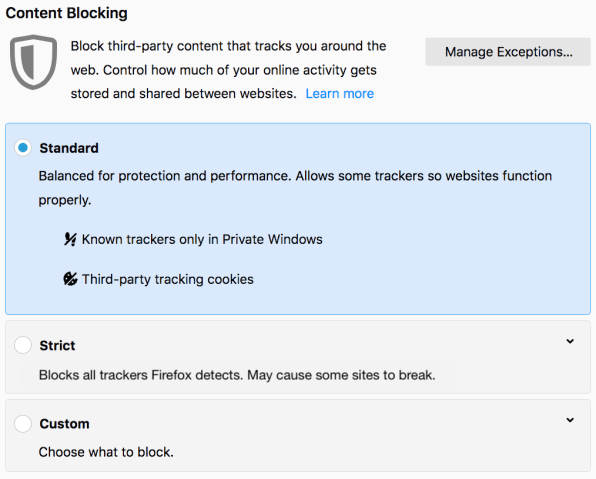
Downloading Beta 65 instead means you don’t have to dig in the settings to turn on enhanced protection. It’s on by default. And if you want to adjust the settings, you’ll find a single, consolidated menu under “Content Blocking,” which is easier to decipher.
The default setting in Beta, called “Standard” may block some ads if they rely on cookies that facilitate tracking. While sites do need a way to earn money, publishers and advertisers also need to find advertising models that don’t compromise the privacy of visitors.
Privacy on the go
The browser situation is quite different, but ultimately simpler, on mobile devices. Mozilla does not make pre-release versions of Firefox widely available on iOS (although the curious can sign up for a limited test program). Both Beta and Nightly are available for Android devices, but there’s an easier option for maximum privacy and security on all phones and tablets: A special mobile browser called Firefox Focus.
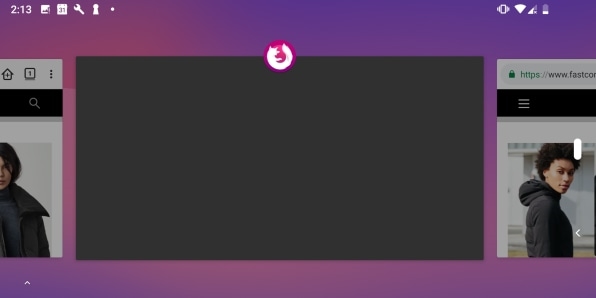
It comes preconfigured with most privacy measures turned on. That includes blocking trackers for advertising, social media, and website analytics. It also erases browsing history every time you close the app, or on-demand when you tap a trashcan icon at the top right of the screen on iOS devices and the bottom right on Android.
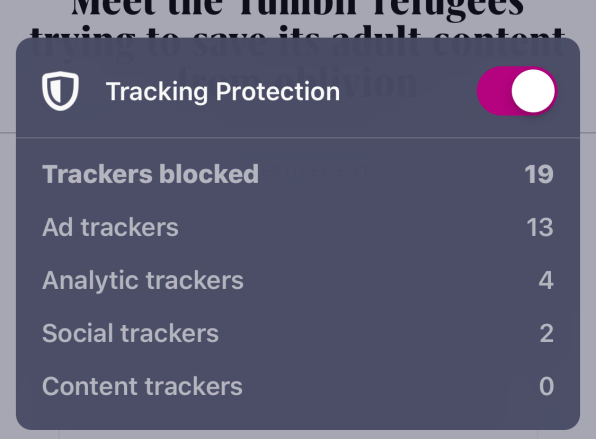
“It’s almost like a burn-after-reading type of experience,” says Peter Dolanjski, product lead for Firefox. He recommends using Focus especially for things like click-bait links to silly or salacious sites that are likely rife with trackers–and not the kind of sites you want memorialized in your history file.
You can take the Focus settings even further, such as requiring face- or fingerprint unlock to access the app in the iOS or Android versions, and blocking the ability to take screen shots (only on Android devices). Of course you can also relax the settings, turning off any of the tracking types, if it makes your browsing easier.
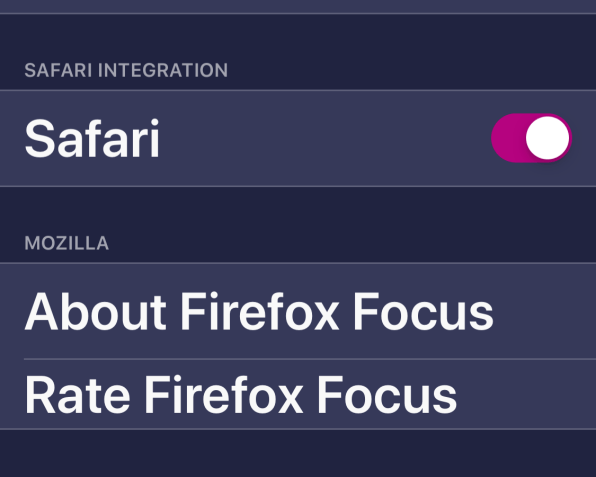
Apple users who love the Safari browser can configure the two apps to work together, so that Focus acts like a plugin to provide all the same content blocking for your browsing in Safari. Mozilla describes the setup process, which just requires flipping a setting switch in each app.
Protecting online privacy and security is an ever-accelerating game of whack-a-mole, and Mozilla vows to keep fighting. In 2019, it plans to take on other types of tracking that harvest technical details from your computer to identify you, as well as to block malware that mines cryptocurrency on computers. As new threats pile up every day, so does the cost of not installing a privacy-centered browser like Focus.
Updated with information on setting up separate profiles for Firefox Beta and Release.
(83)



